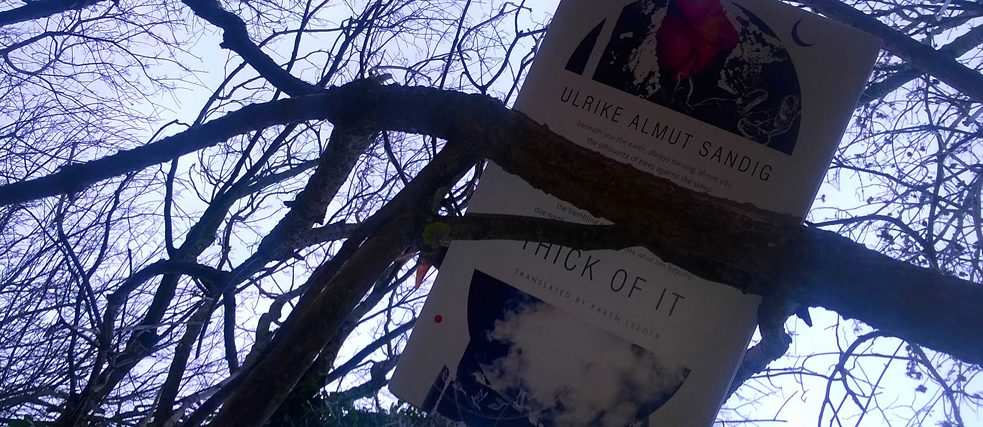December 2018
Ulrike Almut Sandig: ‘But I won’t say a word…’

One of the most eagerly awaited debuts to emerge from the Scottish poetry scene in recent years was Rachel McCrum’s The First Blast to Awaken Women Degenerate (originally published by Freight, 2017, and mercifully re-released by Stewed Rhubarb, 2018). McCrum had already gained a following thanks to her lively and irreverent performances, and her debut collection melds the energy and immediacy she’d become known for with a surreal and occasionally menacing sensibility.
Ulrike Almut Sandig is another poet who undercuts any opposition between page and stage; Sandig’s startling live performances interweave her intricate and lyrical poems with techno beats. Her work appeared in English for the first time in 2018, with the gorgeously produced Thick of It (Seagull Books, tr. Karen Leeder). Although both Sandig and McCrum very much have their own aesthetic, the collections share a rootedness in – or uprootedness from – place. Where McCrum's collection travels between Northern Ireland and Edinburgh, Sandig’s poems are organised into ‘North’ and ‘South’. A single poem, ‘the centre of each of our bodies’, acts as a hinge between the two.
Beyond this, McCrum and Sandig revisit older texts to offer a challenging yet sidelong look at the political. The title The First Blast to Awaken Women Degenerate intentionally misquotes a particularly misogynistic passage from Scottish reformer John Knox, and McCrum’s poems offer heartfelt, rebellious and questioning examinations of gender politics – as well as of themes of exile and migration. Sandig’s collection, meanwhile, is peopled throughout by forests and trees:
‘but I won’t say a thing about the way trees shimmer
in the light, nor about the trees themselves.’
These bold opening lines from one of the first poems in the book set the collection’s agenda, borrowing from some of Bertolt Brecht’s more well-known poems, which set an enchantment with nature up in opposition to meaningful political engagement (‘What kind of times are these when / To talk about trees is almost a crime / Because it implies silence about so many horrors?’). Sandig constantly inverts this, perhaps re-writing Brecht’s concern for a twenty-first century in which nature poetry is no longer a form of escapism but is rather urgently political.
The result is a collection which revels in the uncanny, the eerie and the unsettling. These are poems which are constantly questioning, which catch the reader off-guard – with their surreal vision, their prescient politicalness but above all with their off-kilter yet inherent sensuousness.